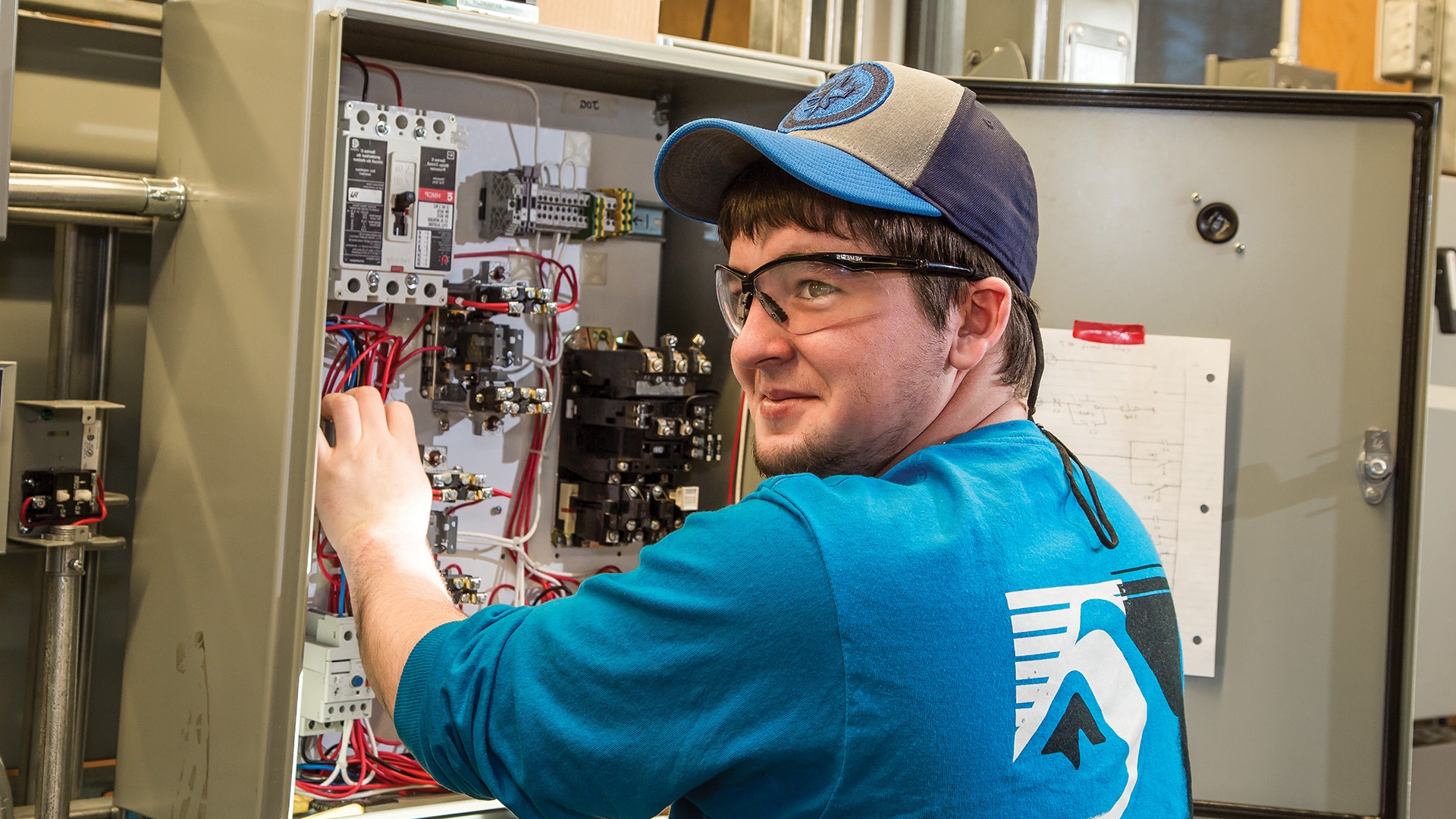Construction Electrician
Overview
Assiniboine’s nine-month Construction Electrician certificate pre-apprenticeship program prepares graduates for a highly technical and in-demand career as a construction electrician.
In Manitoba the construction electrician is a compulsory trade, which means you must be a certified journeyperson or a registered apprentice in order to work in this trade.
Construction electricians plan, design, assemble, install, alter, repair, inspect, verify, commission, connect, operate, maintain and decommission electrical systems. Electrical systems provide heating, lighting, power, alarm, security, communication and control in a variety of environments.
Construction electricians may be self employed or employed by electrical contractors, utilities, and operations and maintenance departments of various facilities and municipalities.
This can be a physically demanding occupation requiring stamina as construction electricians spend much of their time performing static and physical tasks. Safety is of prime importance to all construction electricians.
Experienced construction electricians may advance to positions such as supervisors, project managers, superintendents, estimators, technicians, system designers, electrical inspectors or start their own contracting business.
Graduates who register as an apprentice within two years of finishing the program, may receive credit for Level 1 Construction Electrician apprenticeship, Level 1 Industrial Electrician apprenticeship or Level 1 Power Electrician apprenticeship.
Program Learning Outcomes
- Complete work in compliance with provincial and/or national codes, applicable laws, standards and ethical practices in industry.
- Comply with health and safety practices and procedures in accordance with current legislation and regulations
- Install, service, and maintain wiring systems
- Install, service, and maintain motors and control systems
- Discuss signaling and communication systems
- Communicate and collaborate with diverse clients, supervisors, coworkers and tradespersons to complete projects on time and to maintain effective working relationships
Examples of what construction electricians can do:
- Read and interpret various types of drawings and specifications.
- Use electrical test equipment and digital technology to ensure system safety, functionality and compatibility.
- Coordinate and facilitate work with clients, co-workers, jurisdictional authorities and other trades.
- Use analytical and problem-solving skills in order to read and interpret diagrams, drawings and specifications.
- Use mechanical aptitude to install, diagnose and repair systems and components.
Success Factors
You might be a good fit for this program if you have or would enjoy:
- Technical aptitude for understanding electrical systems and circuitry
- The physical ability required to work in tight spaces, climb ladders, and lift heavy objects.
- Troubleshooting electrical problems
- Are meticulous and pay close attention to detail
- Are safety conscious and able to communicate effectively
- Are adaptable to changing situations and work effectively in a variety of settings.
- Are self-motivated and able to stay on task without direct supervision.
- Are able to work safely and effectively in a variety of settings.
- Can work in a collaborative team environment or independently as the situation requires.
A valid driver’s license and access to a vehicle is strongly recommended given the potential need to travel for practicum placement.
The industry and program environment require individuals to:
- Be reliable, punctual, and regularly attend.
- Move around and work within the environment, negotiating different areas including stairs and ladders, confined spaces, heights, uneven terrain and scaffolds.
- Complete responsibilities requiring standing, bending, and climbing.
- Have strength, dexterity, balance and stamina.
- Work in environments with noise, dust and/or fumes with appropriate personal protective equipment.
- Interpret drawings, specifications, codes, regulations, laws and standards.
- Communicate effectively with suppliers, co-workers, other trades people, safety and building inspectors, manufacturer representatives, and customers.
- Work in industry-specific shifts, schedules, and conditions.
- Listen to and follow directions accordingly.
- Demonstrate safety-conscious attitudes and work practices.
- Work outdoors in extreme weather conditions.
Interested in exploring similar program options?
We've got you covered! Here's another great program option to consider.
Admissions
Admission Requirements
- A complete Manitoba Grade 12 or equivalent
- Consumer/Essential Mathematics 40S or equivalent
If you received your education outside of Manitoba, please review the equivalent admission requirements: Interprovincial or International.
English is the language of instruction at Assiniboine. All applicants educated outside of Canada or in a country not on the test exempt list are expected to meet the English language proficiency requirements.
READY TO TAKE THE NEXT STEP IN YOUR EDUCATION JOURNEY?
Start your online application today and join Assiniboine College!
DON'T MEET ADMISSION REQUIREMENTS?
If you don’t meet admission requirements, visit our Centre for Adult Learning to upgrade courses.
Careers & Connections
Career Opportunities
- Electrical contractors
- Construction companies
- Maintenance departments of industrial companies
- Public utilities
- Wholesale supply houses
- Entrepreneur
Connections
Students who successfully complete the accredited program with an accumulative average of 70% or better in the trade subjects and level for which the program was accredited, gain employment and register as an apprentice within two years of graduating, will receive credit for Level 1 in-school technical training and 900 hours in the Construction, Industrial or Power Electrician apprenticeship program.
Assiniboine has a number of agreements with other colleges, universities and professional organizations, making it possible to apply credit taken at Assiniboine to programs at other institutions. For information on agreements, see Articulation Agreements.
Tools & Supplies
Students in the Construction Electrician program benefit from various teaching techniques such as lecture, instructor hand out, presentations, assignments and hands-on projects. All instruction takes place either in the classroom or shop setting.
Our classrooms, labs and shops are equipped with the necessary equipment that you need to make the most of your experience. However, there are some tools and supplies that you will need to purchase for personal use to help you with your studies. Much of what you purchase you’ll be able to use after you graduate and begin your career.
Students are advised not to purchase tools until the second week of school. The School of Trades holds a Tool Fair during this week where students meet with various suppliers and purchase tools at reduced costs.
Program Checklists, Textbooks, and Supplies
Program Checklists:
Textbooks:
Supplies:
ASSINIBOINE BOOKSTORE
Textbooks, supplies and uniforms may be purchased at the Assiniboine Bookstore at the Victoria Avenue East Campus. Booklists are available from your school office 30 days prior to the start date of your program.
Technology Requirements
Students in this program are expected to have a computer at home with internet access that meets the technical needs outlined by the program. For more details, see At-Home Computing.
Courses & Costs
Costs
Estimated Program Costs (Domestic students)
| Credits | 65.0 |
| Tuition | $4,020 |
| Course Fees | $1,650 |
| Students' Association fees (including Health Premium) | $645 |
| Estimated textbooks, tools, and supplies | $1,600 |
All fees are estimated and subject to change without notice.
Estimated Program Costs (International students)
| Credits | 65.0 |
| Tuition | $17,480 |
| Course Fees | $1,650 |
| Students' Association fees (including Health Premium) | $645 |
| Required Health Insurance | $825 |
| Estimated textbooks, tools, and supplies | $1,600 |
All fees are estimated and subject to change without notice.
For more information, visit the Fees and Charges page.
Courses
To graduate with a Construction Electrician certificate, students must successfully complete 63 academic credits and 5 practical credits. The minimum passing grade for each course is indicated on the course outline. Course offerings are subject to change and may vary by intake.
Courses
| Title | Credits/CEUs | Elective | Distance | PLAR |
|---|---|---|---|---|
AC Machines (ELEC-0017)Prerequisite: ELEC-0022 Three-phase Theory |
6 credit(s) | No | No | No |
AC Theory Devices & Circuits (ELEC-0020)Prerequisite: ELEC-0021 DC Theory Devices & Circuits |
6 credit(s) | No | No | No |
Blueprint Reading (ELECT) (DRFT-0009)This course provides the fundamental skills necessary for students to become familiar with residential and commercial blueprints and the electrical trade. |
3 credit(s) | No | No | No |
College Foundations (PEDV-0356)This course improves students' ability to navigate the college experience and environment, including student's rights, roles, and responsibilities. In this course, students reflect on their skills, attitudes, and expectations and develop learning strategies to help them to become successful, resilient, and self-directed learners. The course covers topics such as success in online learning, time management strategies, learning strategies, assessment taking strategies, academic integrity, information and digital literacy, and wellness, among others. It integrates elements of student orientation. |
0 credit(s) | No | No | No |
Commercial Wiring (ELEC-0014)Prerequisite: ELEC-0018 Residential & Premise Wiring |
9 credit(s) | No | No | No |
Communications (COMM-0045)This course includes instruction in techniques to improve both written and oral communication with prospective employers, co-workers and clients. Effective strategies for customer service are emphasized. It also serves to familiarize students with the regulations related to the workplace. As well, students receive an introduction to the use of computer software and hands-on experience with Windows operating system, Internet and email. |
3 credit(s) | No | No | No |
DC Theory Devices & Circuits (ELEC-0021)This course introduces basic electrical concepts devices and DC circuit analysis. Students perform circuit calculations involving two-and three-wire circuits and learn the correct use of meters in the electrical trade. |
6 credit(s) | No | No | No |
Electrical Code 1 (ELEC-0019)This course covers the Canadian Electrical Code with an emphasis on applying the code to residential construction. |
6 credit(s) | No | No | No |
Electrical Code 2 (ELEC-0015)Prerequisite: ELEC-0019 Electrical Code 1 |
6 credit(s) | No | No | No |
Practicum 1 - ELEC (PRAC-0076)Prerequisites: Cumulative weighted grade point average (CWGPA) of 2.0 or greater and ELEC-0020 AC Theory Devices & Circuits, ELEC-0019 Electrical Code 1, ELEC-0018 Residential & Premise Wiring. |
2 credit(s) | No | No | No |
Practicum 2 - ELEC (PRAC-0077)Prerequisites: Cumulative weighted grade point average (CWGPA) of 2.0 or greater and PRAC-0076 Practicum 1 - ELEC, ELEC-0015 Electrical Code 2, ELEC-0016 Solid State Theory and Diodes, ELEC-0014 Commercial Wiring. |
3 credit(s) | No | No | No |
Residential & Premise Wiring (ELEC-0018)This hands-on course covers all aspects of wood frame residential wiring. Students rough wire a simulated dwelling unit using non-metallic sheathed cable and finish with standard receptacles, switches, lights and electric heaters. The project includes service equipment and grounding. All work is done in accordance with the Canadian Electrical Code. Installation and termination of coaxial cable (RG6), installation, termination and testing of category three (telephone), category five (computer network) and multi-made, fiber-optic cable are also performed. |
12 credit(s) | No | No | No |
Solid State Theory (ELEC-0038)Prerequisite: ELEC-0022 Three-phase Theory |
3 credit(s) | No | No | No |
Three-phase Theory (ELEC-0022)Prerequisite: ELEC-0020 AC Theory Devices & Circuits |
3 credit(s) | No | No | No |





